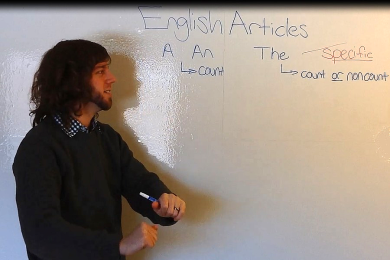
10 Grammatical Mistakes You Probably Make
Grammar may annoy you, but face the facts and understand it is necessary when speaking and writing in all languages. For that reason I'm publishing 10 Grammatical Mistakes You Probably Make. These are errors I see and hear often, both from my students and native English speakers. Avoiding these mistakes will enable you to communicate more effectively and protect you from looking silly. Watch the video and read the content!
1. Fewer and Less
Few and fewer are used with quantifiable (count) numbers. I had 3 fewer errors this week than last. Less is for more hypothetical (non-count) numbers. It rained less yesterday.
2. Bring and Take
The difference is pretty simple. Bring is when something moves toward the subject. Can you bring me a pizza? Take is when something moves away from the subject. Take a slice from the box!
3. Who and Whom
Who is the subject pronoun (he, she, it, we, they) while whom is the object pronoun (him, her, it, us, them). Read the whole article!
4. It's and Its
It's is the contraction for it is. It's a beautiful day! (It is a beautiful day). Its is a possessive pronoun. Look at its tail.
5. Missing or Incorrect Article
People often use the wrong article. The is for specific nouns while a and an are not. Watch the video!
6. Missing Comma
A missing comma can destroy the intent of your sentence. I love cooking my cats and my wife.
Now that's crazy! With commas it's better. I love cooking, my cats, and my wife.
7. Lay and Lie
Most native speakers don't even know the difference.
Lay requires a subject and object. Its present tense is lay and past tense is laid. I laid the towel down on the beach.
Lie doesn't require an object. Its present tense is lie and its past tense is lay. I'm going to lie down. She lay down next to
me.
8. Run-on Sentences
Make sure your sentences don't run on and on too long. Split up your run-ons to make more sense and to make it easier to understand. Also, use a comma before conjunctions (such as and, but, or).
9. Farther and Further
This is similar to fewer and less. Farther is for a distance you can measure. I drove 1 mile farther than I needed to. Further is for abstract lengths. I can't walk much further.
10. Since and Because
Since has to do with time, and because refers to a cause (as in cause and effect). I haven't eaten meat since I was 6. I was leaving because I was tired.










